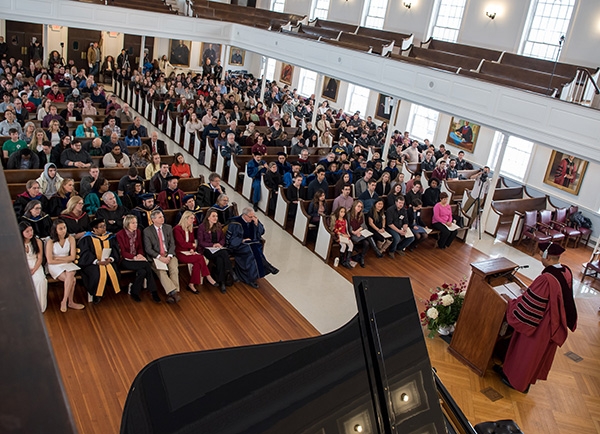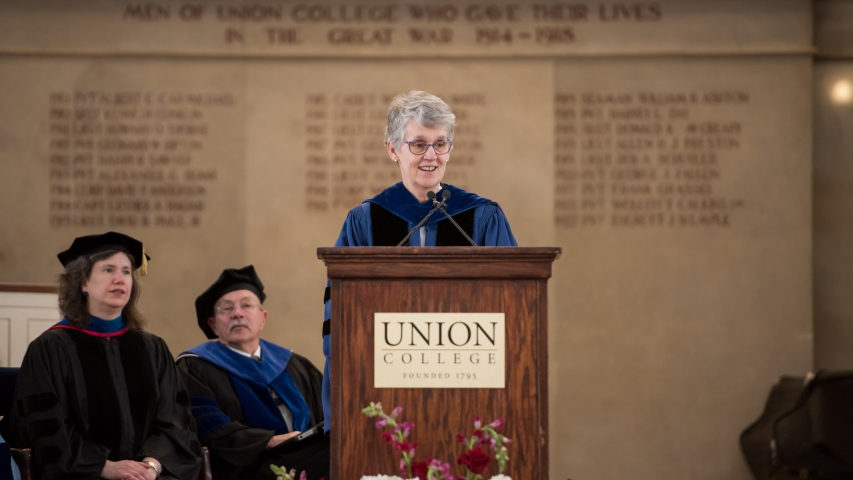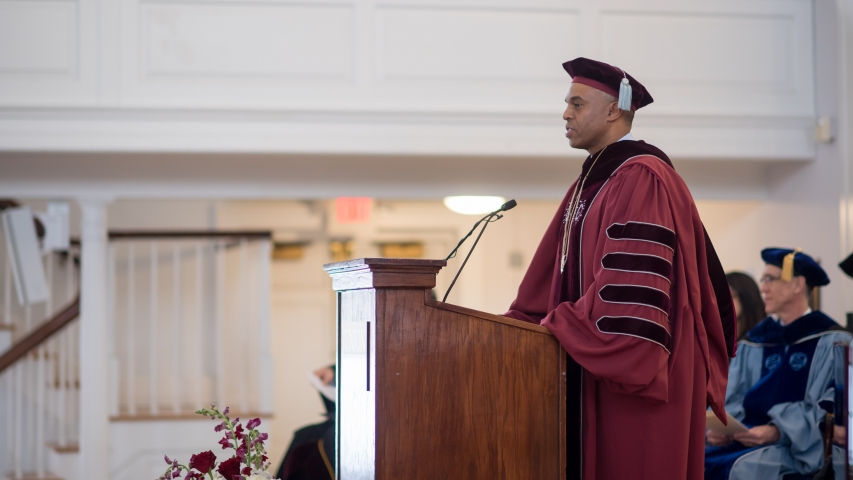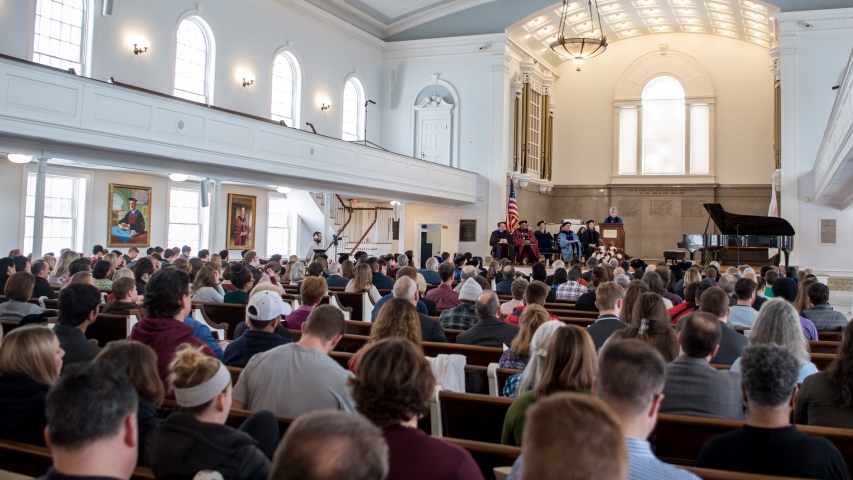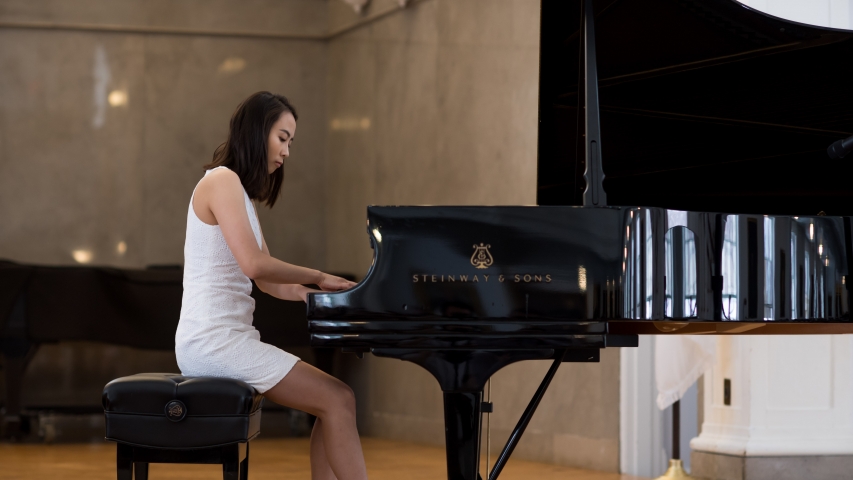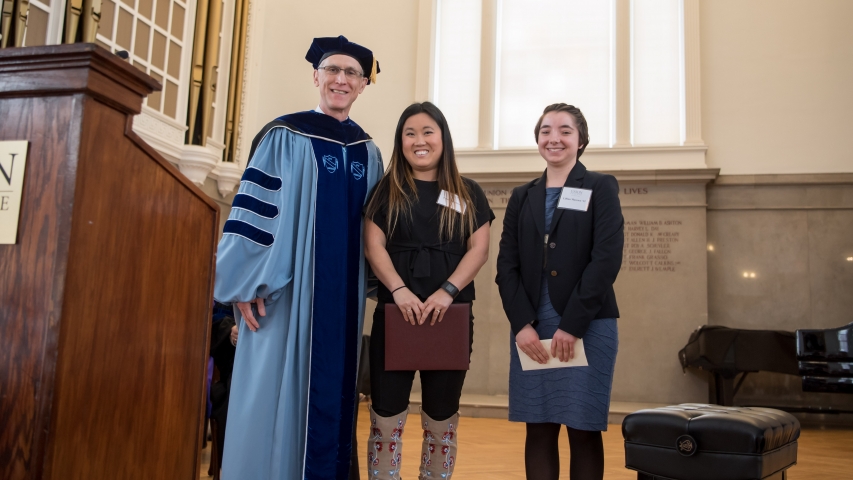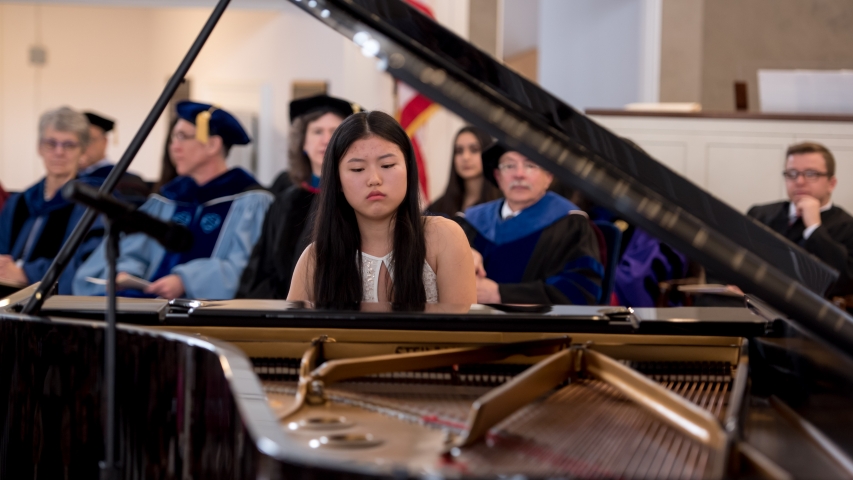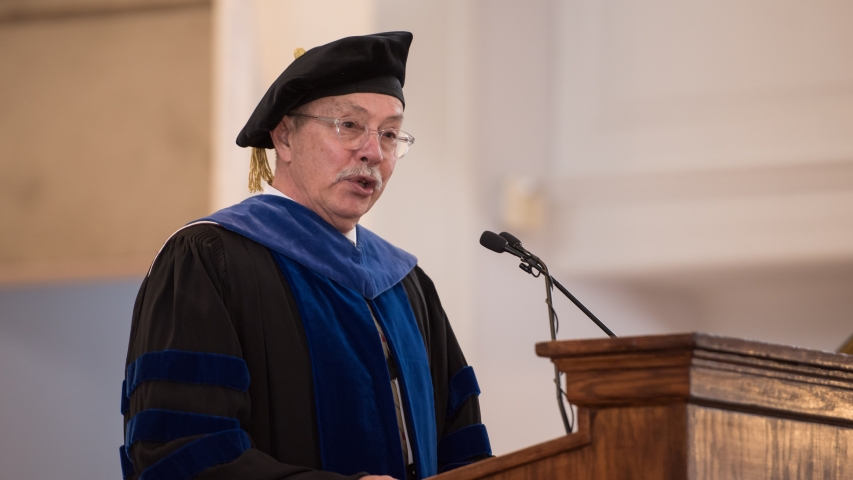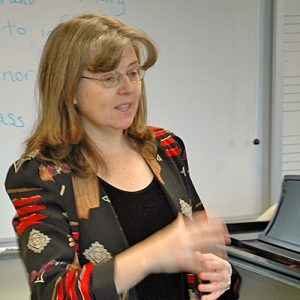In the fall of 1970, a group of 126 women made history when they arrived on campus to begin their college journey. Joining more than 300 other first-year students, they were the first full-time undergraduate women admitted to Union.
Among them was Katherine Stout ’74. A top scholar and star athlete from nearby Guilderland, Stout was accepted through early decision. That gave her the distinction of being the first of the new admits.
“I’ve been to campus a few times and met some of the students there,” the 17-year-old told the Times Union of Albany before she officially moved in. “The guys seem to be indifferent about the whole thing. But the administration is acting like a miracle had happened.”
It may not have been a miracle, but Union’s decision to go coeducational was transformative. As the College plans to mark the 50th anniversary of this milestone next year, it was the focal point of Thursday’s Founders Day celebration.
The event commemorates the 224th anniversary of the College’s charter. Founded in 1795, Union was the first college chartered by the Board of Regents of the State of New York.
The keynote speaker, Catharine Bond Hill, the former president of Vassar College, gave an overview of the period when Union and other schools began admitting women. The civil rights movement and the Vietnam War dominated the era, promoting profound change in the country, particularly on college campuses.
“Young people had found their voice and realized they had power to encourage change, and colleges and universities responded,” Hill told the audience in Memorial Chapel. “They had to. Admissions, the curriculum, and rules and regulations changed at a speed not normally experienced on academic campuses.”
Union was no different. In 1968, President Harold Martin appointed a committee to study the issue of admitting women. After much deliberation, the school decided to welcome women full-time.
Hill shared what Martin told the trustees: “I suspect that the wisest course is to think in terms of some extra human beings…except for ironing boards, increased closet space and full-length mirrors.”
“I’m not sure about the stereotypes implicit in that last part, but I like the idea of referring to significantly changing the demographics of your community as welcoming additional human beings to the community,” Hill said.
She also shared her own experience as a member of the second class of women admitted to Williams College.
“They weren’t completely ready for having women on campus, but in general, the transition to co-education, from my perspective, went well,” said Hill, managing director of Ithaka S+R, a higher education consulting firm. “I discovered economics, which I loved, and never felt unwelcome in that department.”
She acknowledged some challenges, including the lack of varsity sports teams for women and inadequate bathroom facilities, but the college worked to address issues they had not anticipated.
“It is important to know that admissions aren’t enough,” she said. “Both anticipating as much as possible and learning from experience, making sure the campus supports those admitted, are important. Students will succeed when they believe they truly belong on campus.”
Since 1970, college attainment rates for women continue to rise, Hill said. But more is needed to increase access for low-income students and those from black, Latino and Native American families. When Hill served as Vassar president from 2006 to 2016, the college reinstated need-blind admissions and replaced loans with grants for low-income families.
Higher education increases the well-being of the individuals in society, but also strengthens the economy and the country, she said. If schools embrace this challenge much like they did with regard to coeducation, progress can be made.
“Our college campuses need to be welcoming to all students seeking higher education,” she said. “Union College’s policies make its commitments to this clear.”
In his first Founders Day greeting, President David R. Harris called the occasion an opportunity for the campus community to come together to not only think about where they are going, but to reflect on where they have been.
“We ask what decisions and non-decisions produced the set of opportunities and challenges we face today, and what specific paths did people pursue,” Harris said. “Just as important, we ask what idea that seems so obvious and simple to us will fix the problems we see. What’s been tried before? Did it work or not? Can we learn from it?”
Also at Founders Day, Teresa A. Henderson, teacher and visual art and design chair at Manilus Pebble Hill School in DeWitt, N.Y., was presented with the Gideon Hawley Teacher Recognition Award. Named for the 1809 graduate of Union who was New York State’s first superintendent of public education, the award is given to secondary school teachers who have had a continuing influence on the academic life of Union students.
Henderson was nominated by Lillian Maresco ’21, a biomedical engineering major.
The ceremony also included the announcement of the Stillman Prize for Excellence in Teaching to Jeffrey Corbin, professor of biology. The prize was created by David I. Stillman ’72, Abbott Stillman ’69 and Allan Stillman in honor of Abraham Stillman, father and grandfather. It is given annually to a faculty member to encourage outstanding teaching. Corbin will be presented with the award at a later date.
In addition, the Hollander Prize in Music, established by Lawrence J. Hollander, the late dean of engineering emeritus, was awarded to Mengjia (Cheechee) Qi ’20 and Zi Wei Xing ’21. Qi performed Gnomenreigen (Dance of the Gnomes) from Two Concert Etudes, S. 145 by Franz Liszt. Xing performed Jardins sous la Pluie (Gardens in the Rain) from Estampes by Claude Debussy.
The celebration opened with remarks from William A. Finlay, College marshal and chair of the Theater and Dance Department; Robert Bertagna ’85, vice chair of the College’s Board of Trustees; Mary Carroll ’86, the Dwane W. Crichton Professor of Chemistry and chair of the Faculty Executive Committee; and Michael Stalteri ’19, president of Student Forum.
The hour-long ceremony concluded with Ode to Old Union, led on organ by Professor of Music and College organist Dianne McMullen.
